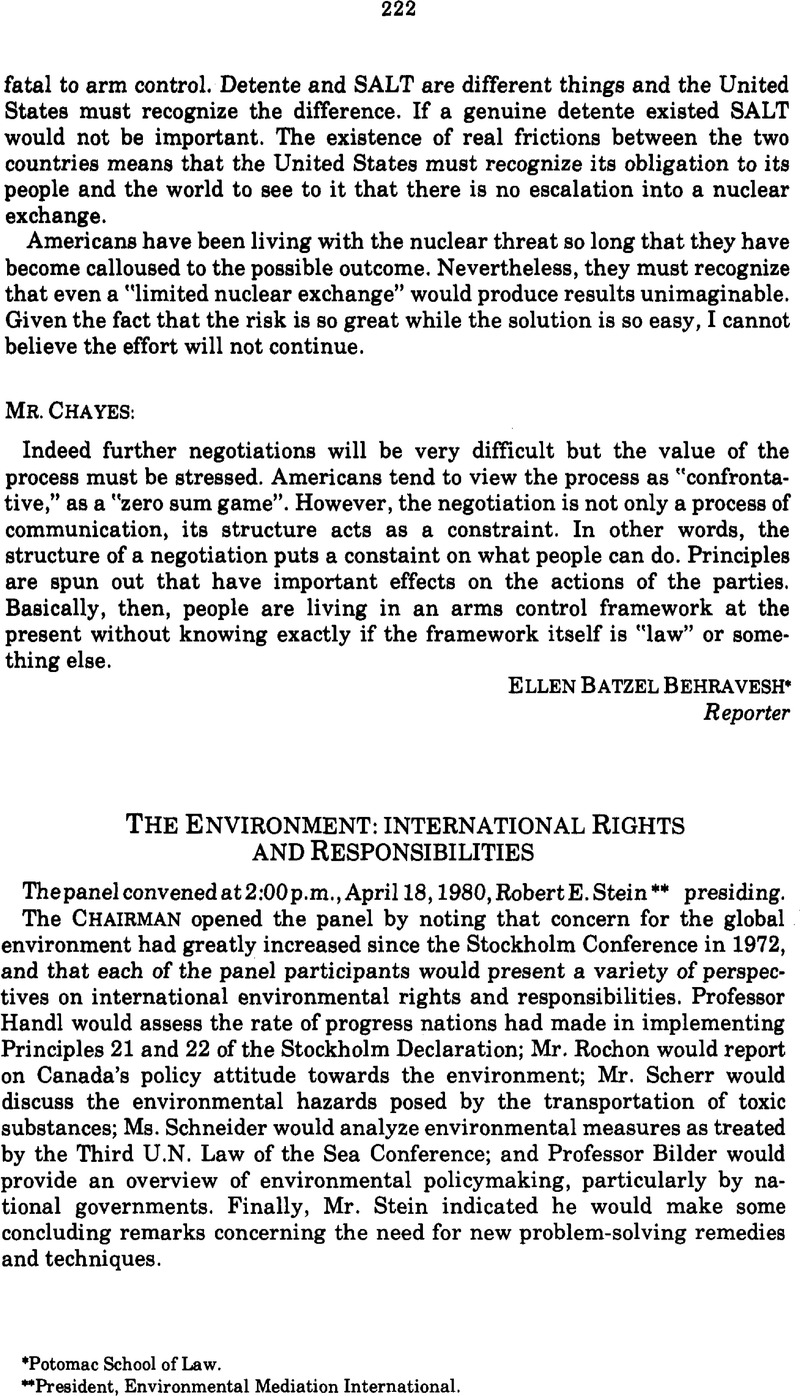No CrossRef data available.
Published online by Cambridge University Press: 28 February 2017

1 See Art. XIII of the Kuwait Regional Convention for Co-operation on the Protection of the Marine Environment from Pollution, reproduced in 171.L.M. 511 (1978); and Art. 235, para. 3 of the Informal Composite Negotiating Text (ICNT), reprinted in 18 I.L.M. 686 (1979).
2 For details on the French government's refusal to submit to Parliamentary ratification the 1976 Convention on the Protection of the Rhine against Pollution by Chlorides, see, e.g., 2 INTL. ENV.REP. 975 (1979); 3 INTLENV.REP. 38 (1980); and The Economist, Dec. 15,1979, 43.
3 Statement released by the Mexican Foreign Ministry on August 23,1979, referred to in The Dallas Morning News, August 25,1979, 26A, Col. 3; see also 10 ENV. REP. 1527 (1979).
4 G. A. Res. 33/87 thus rather than adopting the principles merely “took note” of the report of the Group of Experts and invited the Secretary-General to transmit it to governments for their study and comments with a view to enabling the Assembly to take a decision on the principles at its 34th session. However, in Res. 34/186 adopted without vote on December 18, 1979, the General Assembly limited itself to calling upon states to use the principles as guidelines in the formulation of bilateral or multilateral agreements on the utilization of internationally shared natural resources and on UNEP to report on implementation of the resolution at the Assembly's 36th session.
5 See e.g., statements made during the Second Committee's debate of the principles, by the representative of Italy, U.N. DOC. A/C.2/34/SR. 28,16; of India, U.N. Doc. A/C.2/34/SR. 31,6; and of Guinea, U.N. Doc. A/C.2/34/SR.58, 6, all of which point towards the unresolved definitional problem concerning the concept of “internationally shared natural resources” as the crucial obstacle to stronger international support for the UNEP Guidelines.
6 Recommendation of the Council on the Assessment of Projects with Significant Impact on the Environment, OECD Doc. C(79)116.
7 See Factors in Determining Activities Calling for Prior Notification under a Bilateral or Multilateral Agreement, Annex II to OECD Doc. ENV/TFP/78.17.
8 [1929] P.C.I.J. Ser. A, No. 23, 27.
9 24 INTLL.REP. 101, at 139.
10 (United Kingdom of Great Britain and Northern Ireland v. Iceland) Judgment of 25 July 1974, [1974], I.C.J. Rep. 3, at 30, para. 70.
11 President Lopez himself did not directly deny the existence of an international legal basis for claims for damages against Mexico. Instead he justified Mexico's refusal to consider payment for damage on the grounds that the U.S. Government had not paid for damage sustained in the Mexicali Valley as a result of the high salinity content of the waters of the Colorado River—a consequence of the extensive use of the water in the United States for irrigation purposes: N.Y. Times, Oct. 3,1979, A5, Col. 5.
12 To this effect G.A. res. 2996 (XXVII), GAOR, 27th Sess., Supp. No. 30, 42.
13 Report of the ILC on the Work of its Thirtieth Session, GAOR, 33rd Sess. Supp. No. 10 (A/33/10) 197 (1978).
14 See e.g., Report of the Working Group on international liability for injurious consequences arising out of acts not prohibited by international law, id. 375, at 378, para. 20.
15 Statement of Claim, Annex A to Note FLA-268 of January 23, 1979, from the Dept. of Ext. Aff. of Canada to the Soviet Ambassador in Ottawa, reprinted in 18 I.L.M. 899, at 907 (1979).
16 Lang, Haftung und Verantwortlichkeit im Internationalen Umweltschutzrecht, in Ius HUMANITATIS (Festschrift f. A. Verdross) 517 (H. Miehsler et al., eds. 1980).
17 See e.g., Ianni, International and Private Actions in Transboundary Pollution, 10 CANADIAN Y.B. INTL. L. 258, at 270 (1973); cf. also J. BALLENEGGER, LA POLLUTION EN DROIT INTERNATIONAL 227 (1975); and Despax, La defense juridique de I'environnement: reflexions apropos de quelques decisions de jurisprudence concernant la pollution de I'eau et de Vatmosphere. J.C.P. 1970. I. 2359, at para. 13.
18 Report of the ILC on the Work of its Twenty-Ninth Session, GAOR, 32nd sess. Supp. No. 10 (A/32/10) 67, at 98-100 (1977).
19 Report of the Working Group, supra note 14, at 377, para. 15.
20 Art. XI, para. 1 of the 1972 Convention on International Liability for Damage Caused by Space Objects, T.I.A.S. 7762.
21 Case concerning the Factory at Chorzow (Claim for Indemnity) (Merita), [1928] P.C.I.J. Ser. A, No. 17,29.
22 Judgment of 30.11.1976 - Case 21/76, Handelswekerij G. J. Bier B. V. v. Mines de Potasse d'Alsace S.A., [1976] E.R.C. 1735.
23 Thus Mr. Diaz-Serrano, head of PEMEX, recently suggested that compensation, if any, to U.S. citizens injured in conseqence of the Campeche spill, would be available only through local Mexican courts. While the execution, in the controlling state, of a judgment obtained in the forum where the pollution injury occurred may at times be problematical, decisions by U.S. courts certainly against PEMEX should be readily enforceable within the United States through attachment of natural gas delivered to U.S. customers by PEMEX or conversely, of money owed by U.S. importers to the Mexican petroleum company. Still, his comment clearly points to a critical issue, namely the harmonization of key substantive (and procedural) national legal parameters bearing on recovery in transnational pollution instances.
24 The issue, of course, does not arise if the conflicts-of-law rules of the forum dictate the choice of law most favorable to the plaintiff. However, such provisions are clearly exceptional: The choice of the forum in general thus tends to imply alsonthe application of the lex fori, hence may bring into play the issue of vastly differing national compensation standards.
25 See e.g., Recommendation 753 (1975).
26 Article VI, para. (6) of its 1979 Resolution on the Pollution of Rivers and Lakes and International Law.